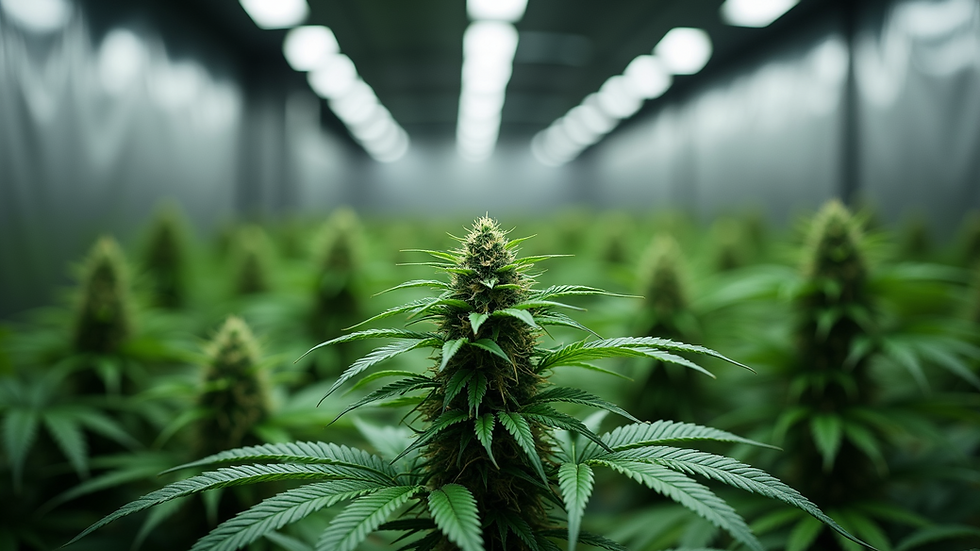The Role of Cannabis Commodities in Modern Healthcare Solutions
- Celso Hamelink
- May 1, 2025
- 4 min read
The integration of cannabis commodities into modern healthcare is no longer merely a topic of debate; it's now a burgeoning area of medical research and application. With the legalization movement gaining momentum across various regions, the scientific exploration of cannabis and its derivatives is rapidly expanding. This article delves into the multifaceted roles that cannabis commodities play in healthcare, emphasizing their potential benefits, applications, and ongoing challenges.
Understanding Cannabis Commodities
Cannabis commodities refer to products derived from the cannabis plant, including flowers, oils, extracts, and edibles. Notably, there are two primary cannabinoids of interest: THC (tetrahydrocannabinol) and CBD (cannabidiol). THC is known for its psychoactive properties, while CBD is celebrated for its therapeutic benefits without the "high." Both compounds have garnered attention in logistical and medicinal contexts.
Studies indicate that the cannabis market is expected to reach USD 73.6 billion by 2027, showcasing a CAGR of 18.1% from 2020-2027. This growth isn't just confined to recreational use; a significant portion is attributed to healthcare applications, including pain management, mental health treatment, and even chronic illness management.

Cannabis Commodities in Pain Management
One of the most widely recognized applications of cannabis in healthcare is in pain management. Chronic pain conditions affect millions of people worldwide. Research indicates that cannabis can help alleviate pain, particularly neuropathic pain, which is notoriously challenging to treat with conventional medications.
For instance, a meta-analysis published in the Journal of Pain found that cannabinoids significantly reduced pain levels in patients with chronic pain. Furthermore, states with legal cannabis programs have observed declines in opioid prescriptions, suggesting that cannabis can serve as an alternative pain management strategy.
Case Study: Opioid Reduction Rates
A study in Colorado that analyzed the impact of cannabis legalization revealed a 6.38% reduction in opioid prescriptions among Medicaid recipients within the first year of legalization. This reduction underscores the potential of cannabis commodities, particularly in treating patients who rely on opioids for pain relief.

Mental Health Benefits of Cannabis Commodities
Beyond physical pain relief, cannabis commodities are gaining recognition for their role in mental health therapy. Conditions like anxiety and depression have seen increasing rates among patients, particularly during the pandemic. Initial studies indicate that CBD, in particular, shows promise as an anxiolytic agent.
In a study published in the Journal of Psychopharmacology, participants reported reduced anxiety levels after taking CBD before public speaking engagements. Anecdotal evidence suggests that many individuals have also found solace in cannabis products through regulated dosages for their anxiety and depression symptoms.
Dosage and Formulation Matters
While research is still ongoing, the specifics of dosage and formulation are crucial. Patients seeking treatment for mental health disorders should consult with healthcare professionals to determine suitable products and dosages. Medical providers may suggest tinctures, oils, or capsules, which provide more controlled dosing compared to smoking cannabis.
Regulatory Challenges and Consumer Safety
Despite the immense potential, the integration of cannabis commodities into mainstream healthcare faces significant regulatory challenges. Many regions still classify cannabis as a Schedule I drug, hindering extensive clinical research. This lack of regulation often results in inconsistencies in product quality and misinformation among consumers.
Furthermore, consumers may encounter products that are insufficiently labeled or lack comprehensive testing for purity and potency. For instance, a study published in the Journal of the American Medical Association found that 70% of CBD products sold online were mislabelled. This discrepancy raises safety concerns and underscores the need for robust quality control measures.

Social Perceptions and Market Trends
The evolving perceptions of cannabis commodities also play a significant role in their acceptance within healthcare. As public opinion shifts, medical professionals are becoming more open to discussing cannabis as a treatment option. In fact, a survey by the American Medical Association found that nearly 60% of physicians believe that cannabis should be legalized for medical use.
The Rise of CBD Products
CBD products are often at the forefront of this trend. With their non-psychoactive properties, CBD items have gained popularity among wellness enthusiasts seeking natural solutions for their health concerns. Products like CBD oils, edibles, and topical creams have entered mainstream markets, significantly increasing accessibility.
Future Directions in Cannabis Research and Applications
As more states and countries legalize cannabis, the future of cannabis commodities in healthcare looks promising. Ongoing research aims to identify the full spectrum of cannabinoids and terpenes in the cannabis plant. Researchers hope to unlock the therapeutic benefits of lesser-known compounds, targeting diverse health issues ranging from inflammation to neurodegenerative diseases.
Potential areas of exploration include personalized medicine, where specific cannabinoid ratios could be tailored to individual patients’ needs, thereby enhancing therapeutic outcomes.
Innovation in Delivery Methods
The industry is also witnessing innovation in how cannabis commodities are delivered. New methods, such as nano-emulsification, are being developed to enhance bioavailability and absorption rates. These advancements could lead to more efficient and faster-acting products, making them ideal for acute medical conditions.
Final Thoughts
The role of cannabis commodities in modern healthcare solutions is rapidly evolving. With ongoing research, changing regulations, and increased public acceptance, the potential impact of cannabis products in managing various health conditions is substantial. As we navigate through these developments, it's essential to promote responsible use and informed discussions around cannabis.
Healthcare professionals, alongside reputable organizations like green leaves biomed, can play a critical role in guiding patients toward safe and effective cannabis-based treatments. Open dialogue, continuous research, and consumer education are key pillars supporting the responsible integration of cannabis commodities within modern healthcare.






Comments